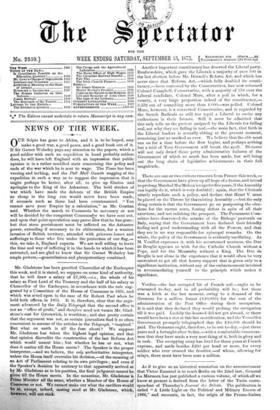Mr. Gladstone has been gazetted Chancellor of the Exchequer this
week, and it is stated, we suppose on some kind of authority, that he will draw a salary of £7,500, i.e., the whole of his salary as First Lord of the Treasury and the half of his salary as Chancellor of the Exchequer, in accordance with the rule sug- gested by a Committee of the House of Commons in 1831, and which was acted upon in the case of Sir Robert Peel when he held both offices, in 1834. It is, therefore, clear that the argu- ment advanced by the Daily Telegraph that the second office is not an "office of profit," and therefore need not vacate Mr. Glad- stone's seat for Greenwich, is worthless ; and also pretty certain that the argument was not, as certain journalists find it so often convenient to assume of the articles in the Telegraph, " inspired." But what on earth is all the fuss about? We suppose Mr. Gladstone has taken the highest legal opinion, and that that opinion discredits the construction of the last Reform Act which would unseat him ; but whether he has or not, what does it matter till the House meets ? The Speaker is the proper interpreter,--and we believe, the only authoritative interpreter, unless the House itself overrules his decision,—of the meaning of an Act of Parliament relating to its own privileges ; and even if the Speaker's decision be contrary to that apparently arrived at by Mr. Gladstone as to his position, the final judgment cannot be given till the House meets. In the meantime, Mr. Gladstone is Prime Minister all the same, whether a Member of the House of Commons or not. We cannot make out what the cavillers would be at, except, indeed, casting mud at Mr. Gladstone, which, however, will not stick.






























